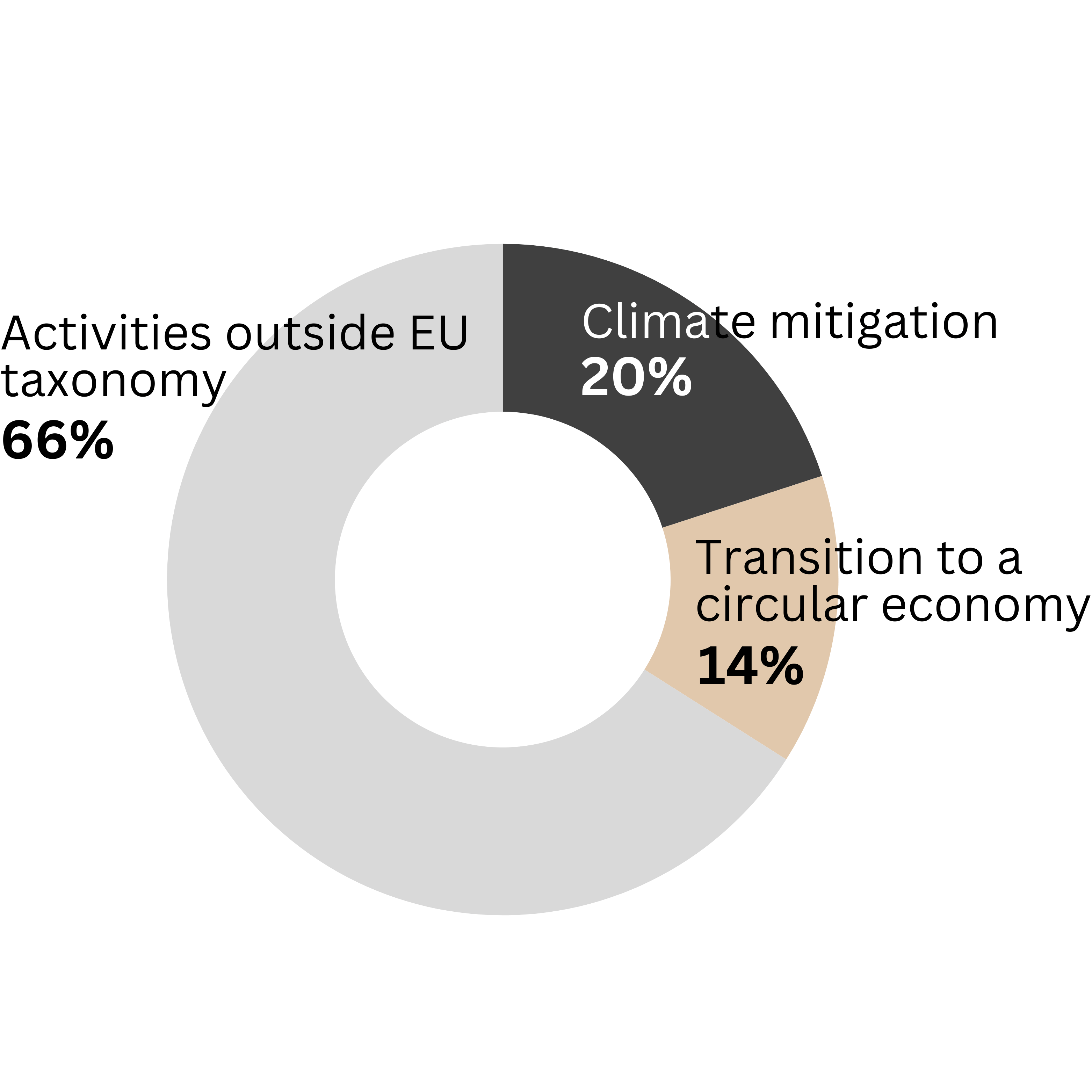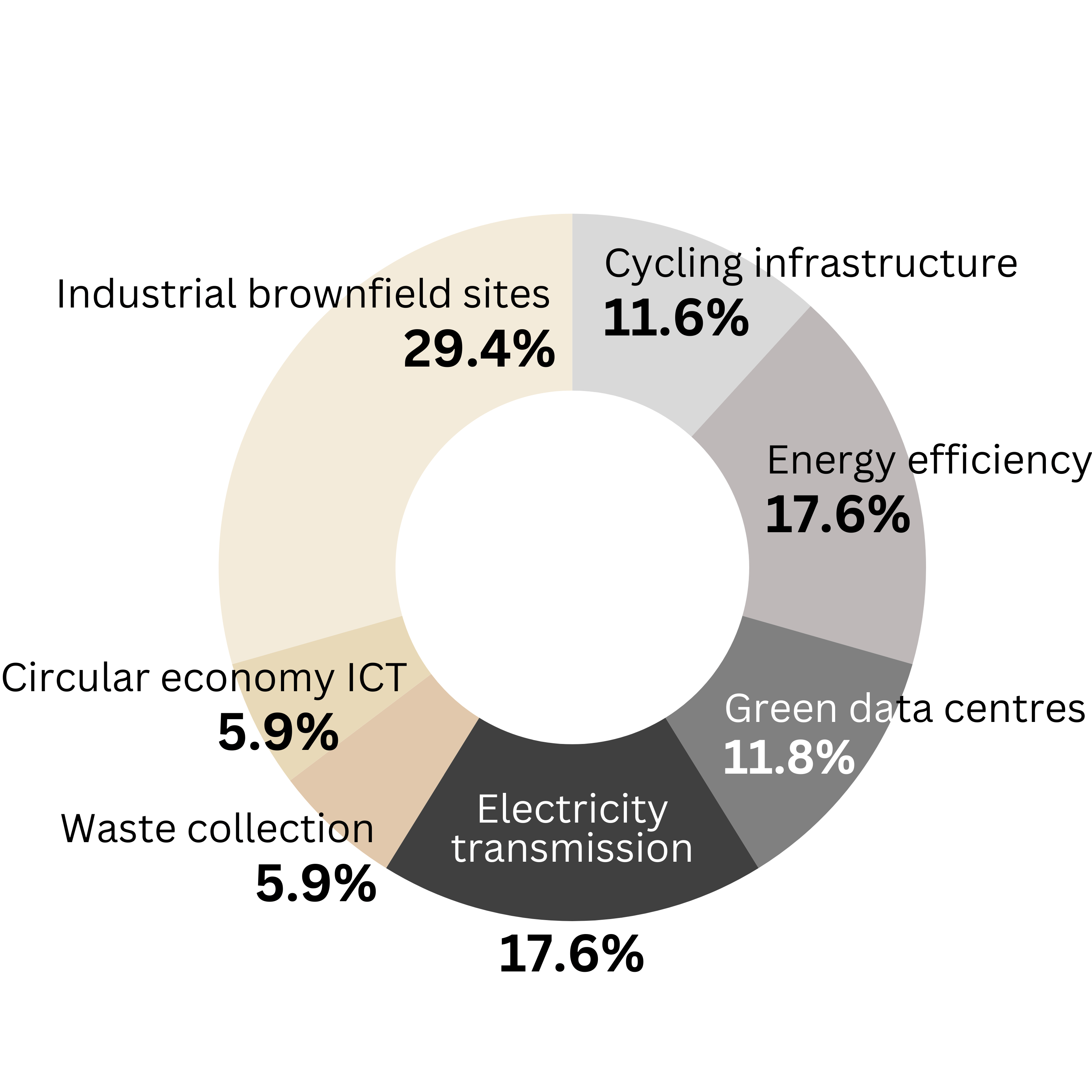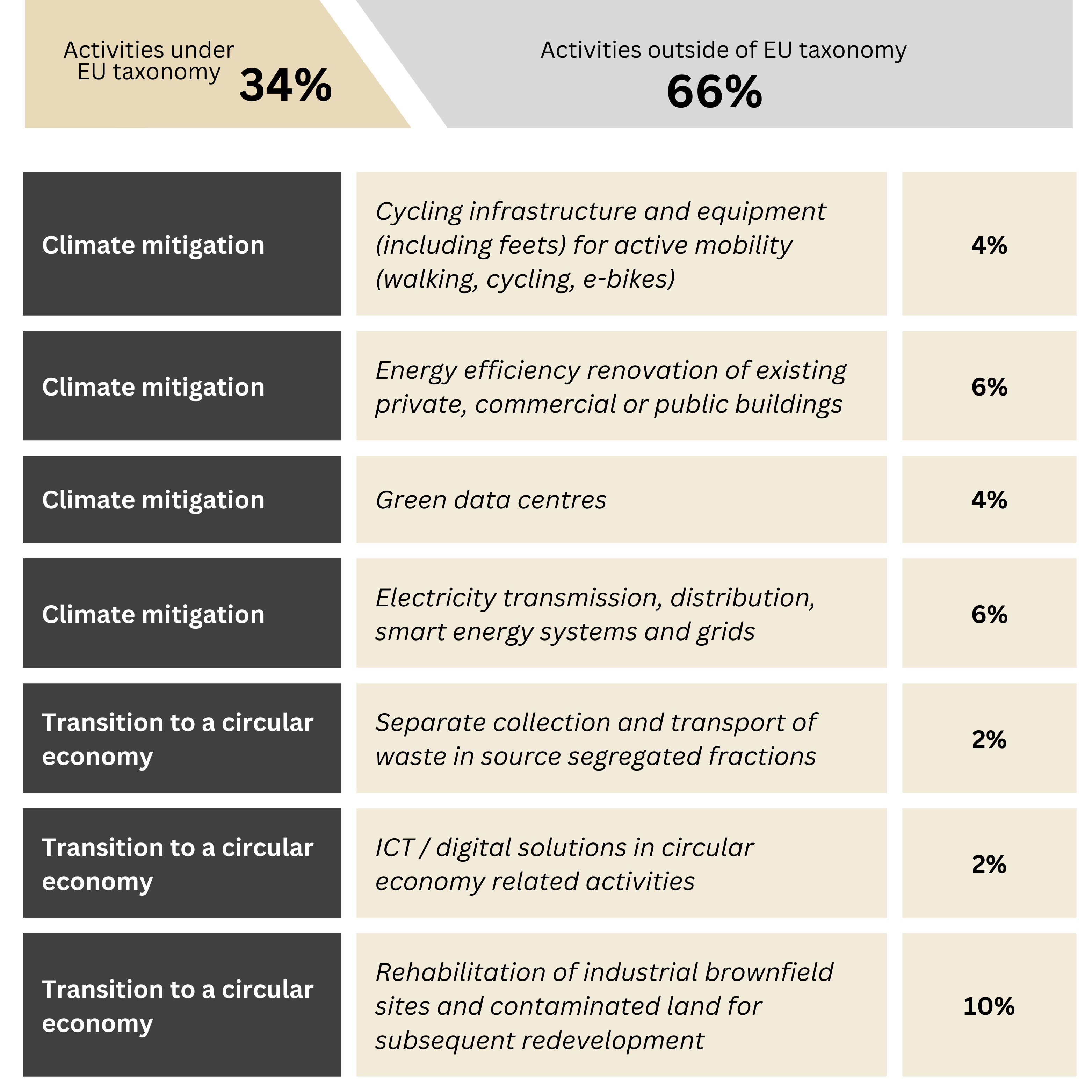OUR GREEN COMMITMENT
EU Taxonomy: Climate Mitigation & Transition to a Circular Economy
Portfolio Allocation
Trivalans is committed to integrating sustainable investment strategies, aligning with the EU Taxonomy for sustainable activities. Our portfolio will be strategically allocated to ensure compliance with EU Taxonomy objectives. Currently, our plan is to allocate c.1/3 of our investments in compliant sectors.



CLIMATE MITIGATION
Cycling Infrastructure and Equipment
Objective:
Energy Efficiency Renovation
Objective:
Green Data Centres
Objective:
Electricity Transmission and Smart Energy Systems
Objective:
TRANSITION TO A CIRCULAR ECONOMY
Waste Collection and Transport
Objective:
ICT/Digital Solutions for Circular Economy
Objective:
Rehabilitation of Industrial Brownfield Sites
Objective:
Our ESG Policy
1. ESG Policy as a Company
Core Values
- Integrity: We conduct our business with the highest ethical standards, ensuring transparency and accountability in all our operations.
- Sustainability: We prioritize environmental stewardship and aim to minimize our ecological footprint through sustainable practices.
- Social Responsibility: We are dedicated to promoting social equity and improving the well-being of the communities we serve.
- Governance: We maintain robust governance structures to ensure effective decision-making and compliance with all regulatory requirements.
Environmental Initiatives
Resource Efficiency: We commit to implementing energy-saving measures in our offices, such as using LED lighting, reducing paper usage and promoting recycling programs.
Carbon Footprint Reduction: We aim to reduce our carbon footprint by encouraging the use of public transportation, carpooling and remote work options for employees.
Social Responsibility
Diversity and Inclusion: We are committed to promoting equal opportunities, supporting diverse hiring practices, and fostering an inclusive workplace culture. Currently, we have a higher representation of women in managerial roles compared to men, and we employ individuals with disabilities. We believe that having women in leadership roles contributes to diverse perspectives, driving innovation and strengthening our decision-making processes. Additionally, we will actively work to hire a diverse workforce and ensure inclusivity in our investee companies.
Governance Practices
- Transparency: We are dedicated to maintaining clear and open communication with our stakeholders through regular reporting on our investments and performance.
- Compliance: We adhere to all relevant laws and regulations, maintaining robust policies to prevent corruption and unethical behaviour.
- Risk Management: We implement comprehensive risk management frameworks to identify and mitigate risks effectively.
2. ESG Considerations in Investments


Investment Principles
We integrate ESG considerations into our investment decision-making process to promote sustainable and responsible investing. Our approach is guided by the following principles:
- Long-term Value Creation: We seek to invest in companies that demonstrate strong ESG performance, as we believe this leads to sustainable long-term growth.
- Impact Investing: We prioritize investments that generate positive social and environmental outcomes alongside financial returns.
- ESG Screening: We incorporate ESG factors into our screening process. This helps us identify potential risks and opportunities early on, ensuring that we invest in companies that align with our ESG objectives and values.
For example, before investing in projects related to the collection and transport of source-segregated waste, we assess the environmental impact and ensure the project supports a circular economy.
Environmental Considerations
Climate Change Mitigation: We will search companies that actively work to reduce their greenhouse gas emissions, enhance energy efficiency and develop renewable energy solutions.
Resource Management: Support businesses that implement sustainable resource management practices, such as water conservation, waste reduction and sustainable sourcing of materials.
Environmental Innovation: Encourage investments in innovative technologies and solutions that address environmental challenges, such as clean energy, sustainable agriculture and circular economy models.
Recycling Initiatives: Target investments in companies like those focusing on recycling of contaminated soil and modernizing plastic production to meet new ecological standards.
Energy Efficiency: Our pipeline investment in the energy efficiency renovation of buildings aims to reduce primary energy demand by at least 30%, showcasing our commitment to these principles.
Impact Assessment: We have begun assessing the impact of climate change on our investments. Where necessary, we will engage consultants to do scenario analysis and climate models to understand the potential risks and opportunities associated with climate change, integrating these insights into our investment decisions.
Our investment pipeline in green data centers, designed to meet the European Code of Conduct on Data Centre Energy Efficiency, exemplifies our commitment to mitigating climate impacts.
Social Considerations
Labour Practices: Evaluate companies based on their labour practices, ensuring they provide fair wages, safe working conditions, and uphold labour rights.
Community Impact: Assess the social impact of investments on local communities, prioritizing companies that contribute positively to social development and community well-being.
Diversity and Inclusion: Invest in businesses that promote diversity and inclusion within their workforce and leadership, recognizing the value of diverse perspectives and inclusive cultures.
Governance Considerations
Corporate Governance: We assess the governance structures of potential investments, ensuring they have strong, independent boards, transparent reporting, and effective oversight mechanisms.
Ethical Conduct: We will prioritize companies that demonstrate high ethical standards, including anti-corruption measures, ethical business practices, and compliance with all relevant regulations.
Stakeholder Engagement: We encourage companies to engage with their stakeholders, including employees, customers, suppliers, and communities, to ensure their business practices align with stakeholder interests and concerns.
Monitoring and Reporting
- ESG Metrics: Develop and track key ESG performance indicators for our investments and business operations.
- Board-Level Oversight: We discuss climate-related risks and opportunities at the board level. Regular reviews of our investments in target companies with climate-smart energy systems and grids are critical for enhancing energy efficiency and reducing carbon emissions.
- Engagement with Portfolio Companies: We plan to engage regularly with our portfolio companies on ESG risks and opportunities. We will discuss their ESG performance, provide support for improvement, and encourage them to adopt best practices. For example, we may use and provide access to an online platform like Impact Nexus for the portfolio companies to input their KPIs. This ongoing dialogue helps us manage risks and enhance value creation.
- Reporting: Transparency with our LPs is a key priority, and we plan to use platforms like Impact Nexus to facilitate reporting and SFDR disclosures.
- Continuous Improvement: Regularly review and update our ESG policies and practices to ensure they remain relevant and effective in addressing emerging ESG challenges and opportunities.
Sustainable Finance Disclosure Regulation (SFDR)
SFDR Fund Classification
As an Article 8 fund, we promote several environmental and social characteristics in our investments, including reducing carbon emissions, enhancing energy efficiency, promoting gender diversity, and supporting community development. These characteristics guide our investment decisions and engagements.
For instance, our investment in cycling infrastructure and equipment for active mobility aims to reduce carbon emissions and promote healthy, sustainable transportation options and our pipeline of investments, such as in energy-efficient renovations and green data centers, reflect our commitment to sustainability.
Good Governance Practices
Our policy for assessing good governance practices includes evaluating the corporate governance structure, board composition, executive remuneration, shareholder rights, and transparency of investee companies. We use these criteria to ensure that our investments are managed responsibly and ethically.
Consideration of Principal Adverse Impacts
Disclosure to Limited Partners
Transparency and accountability with our LPs is a key priority. We are committed to establishing a formal approach to clearly outline how we integrate environmental and social considerations into our investment decision to our Limited Partners.This includes detailed reports on how our investments align with our ESG objectives and the broader impact on society and the environment.
Our Commitment to the SDGs

Our commitment to diversity and inclusion, with an emphasis on promoting women to managerial positions, aligns with the goal of achieving gender equality.

Investments in cycling infrastructure, energy-efficient buildings, and waste management contribute to making cities and communities more sustainable.

Our focus on the circular economy, waste management, and sustainable production practices aligns with responsible consumption and production goals.

Climate mitigation strategies, including investments in energy efficiency, renewable energy, and climate-smart technologies, are critical to our operations.
